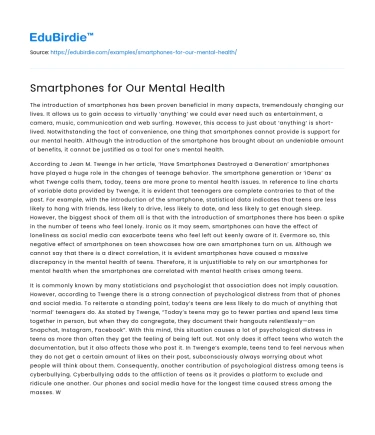The introduction of smartphones has been proven beneficial in many aspects, tremendously changing our lives. It allows us to gain access to virtually ‘anything’ we could ever need such as entertainment, a camera, music, communication and web surfing. However, this access to just about ‘anything’ is short-lived. Notwithstanding the fact of convenience, one thing that smartphones cannot provide is support for our mental health. Although the introduction of the smartphone has brought about an undeniable amount of benefits, it cannot be justified as a tool for one’s mental health.
According to Jean M. Twenge in her article, ‘Have Smartphones Destroyed a Generation’ smartphones have played a huge role in the changes of teenage behavior. The smartphone generation or ‘iGens’ as what Twenge calls them, today, teens are more prone to mental health issues. In reference to line charts of variable data provided by Twenge, it is evident that teenagers are complete contraries to that of the past. For example, with the introduction of the smartphone, statistical data indicates that teens are less likely to hang with friends, less likely to drive, less likely to date, and less likely to get enough sleep. However, the biggest shock of them all is that with the introduction of smartphones there has been a spike in the number of teens who feel lonely. Ironic as it may seem, smartphones can have the effect of loneliness as social media can exacerbate teens who feel left out keenly aware of it. Evermore so, this negative effect of smartphones on teen showcases how are own smartphones turn on us. Although we cannot say that there is a direct correlation, it is evident smartphones have caused a massive discrepancy in the mental health of teens. Therefore, it is unjustifiable to rely on our smartphones for mental health when the smartphones are correlated with mental health crises among teens.
Save your time!
We can take care of your essay
- Proper editing and formatting
- Free revision, title page, and bibliography
- Flexible prices and money-back guarantee
It is commonly known by many statisticians and psychologist that association does not imply causation. However, according to Twenge there is a strong connection of psychological distress from that of phones and social media. To reiterate a standing point, today’s teens are less likely to do much of anything that ‘normal’ teenagers do. As stated by Twenge, “Today’s teens may go to fewer parties and spend less time together in person, but when they do congregate, they document their hangouts relentlessly—on Snapchat, Instagram, Facebook”. With this mind, this situation causes a lot of psychological distress in teens as more than often they get the feeling of being left out. Not only does it affect teens who watch the documentation, but it also affects those who post it. In Twenge’s example, teens tend to feel nervous when they do not get a certain amount of likes on their post, subconsciously always worrying about what people will think about them. Consequently, another contribution of psychological distress among teens is cyberbullying. Cyberbullying adds to the affliction of teens as it provides a platform to exclude and ridicule one another. Our phones and social media have for the longest time caused stress among the masses. We must ask ourselves, “Can we really depend on our smartphones to solve our mental issues when they are the cause?”. The amount of emotional strain put on teens outweighs the idea of smartphones as a beneficiary.
Sleep is a beneficial and universal thing that everyone needs. Benefits of sleep include reducing stress, improving your mood, better focus, reducing your risk of depression, helping your immune system and so on. However, with the introduction of the smartphone and social media platforms there has been a striking increase in the percentage of teens who get less than seven hours of sleep. Smartphones make it hard for us to receive proper sleep, therefore detrimental to our health. If there are benefits to getting enough sleep than the opposite of that would be drawbacks. Deprivation of sleep compromises many of our everyday functionality such as memory, concentration, balance, and many other things. According to Twenge, although we do not whether smartphones and lack of sleep leads to depression or vice versa, it plays a role in all negative behavioral patterns of teens and mental health.
Those who are keen on the benefits of smartphones may argue that we are blind to the bigger ‘picture’. Supporters of smartphones such as Joanna Rodriguez and Nadine Page of the University of Surrey in their article ‘Your Smartphone Could Be Good for Your Mental Health” argue that our smartphones actually open up the potential for people to gain better access to mental health services. ‘Telemedicine’ is an idea that is brought up in which it represents for a significant alternative for quick communication between individuals and mental health services. This fast communication allows for people to take better care of themselves ultimately unlocking many other benefits as well.
However, although it may sound nice on paper, this idea is still formulated on ideas and what could be. Until there is enough evidence provided to showcase, that smartphones are more beneficial than thought, smartphones still have been more detrimental to our health - as research indicates. As more research is done to understand the connection of smartphones and the increase of mental health issues among the mass, the stance of smartphones being more detrimental to our health is heavily supported otherwise. Therefore, we cannot rely on smartphones as a tool for one’s mental health and must find better alternatives.






 Stuck on your essay?
Stuck on your essay?

